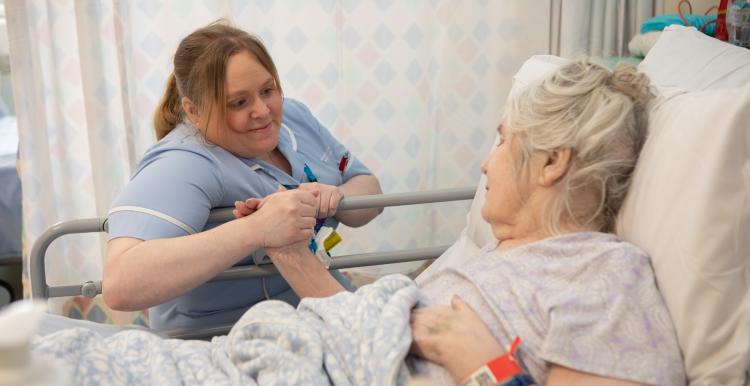Cancellations of NHS care are having serious impacts on two-thirds of patients

Our new research shows that people are currently facing multiple cancellations or postponements of care which are having a significant impact on their lives and symptoms, while further increasing health inequalities.
About our research
We commissioned a survey of 1084 people who have seen their NHS care either cancelled or postponed this year to understand the extent of disruption to care amid rising waiting lists, workforce issues, and industrial action, and other pressures on the NHS.
Key findings
- Over one in three, 39%, have had their NHS care cancelled or postponed two or more times this year. This has included hospital operations, tests, scans, outpatient appointments, and community health service appointments.
- Nearly one in five (18%) of the respondents have had their care cancelled or postponed at the last minute, which the NHS defines as on the day of or on arrival to an appointment. And almost half, 45%, experienced a cancellation with between one- and seven-days notice.
- Two-thirds of the respondents, 66%, said cancellations to care had impacted their lives, reporting ongoing pain, worsening mental health, worsening symptoms, and disrupted sleep, among many other problems.
NHS pressures widen existing health inequalities
Disruptions to care disproportionately affect certain groups, widening existing health inequalities. People who have greater health needs are still facing serious barriers to timely care, and they are also more likely to be more affected by cancellations of care.
- Unpaid carers, 84%, and neurodivergent people, 83%, were more likely to report negative impacts of cancelled care on their lives, followed by people on low incomes, 80%; and those from minority ethnic backgrounds, 75%.
- Groups who were more likely to have had two or more NHS postponements or cancellations included disabled people, 52%; neurodivergent people, 51%; and people on lower incomes, ethnic minorities and LGBTQ+ being affected the most, 49%, respectively.

Andrea’s story “We can’t do it; there’s no gap for you”
On the day of her follow up appointment with a stroke unit, Andrea, a teacher from the Isle of Wight, was told that it had been cancelled due to staff illness. The six-week appointment was already late, seven weeks following hospital discharge. “They just said “we can’t do it, there is no gap for you”. They told me the earliest they could reschedule my appointment was another six weeks later.”
“I had a lot of questions for my stroke treatment team, but I wasn’t able to ask them. Instead, I had to use the time at my GP appointment."
Andrea has since discovered that the underlying cause of her stroke is a cardiac issue which requires urgent medical attention. She’s very worried that she has to wait for care for so long.
“I go through phases where I sleep all afternoon and I’m spending the mornings making phone calls and trying to get appointments. My full-time job has become trying to manage my illness. That takes up what little energy I’ve got and that is very depressing.”
The survey also found:
- More than three-quarters, 79%, of the respondents said the NHS had offered them ‘very little’ or ‘no support’ to manage their mental health risks.
- More than half, 52%, said they hadn’t been offered support to manage their medical condition during the new wait for care, 24% had had ‘a lot’ or ‘some’ support and 21% said ‘a little’ support.
- One in seven,15%, were told their care had been cancelled due to industrial action in the NHS, while nearly a quarter, 24%, believed strike action was the reason, though they had not been told this.
- Nearly half, 41%, said their care was cancelled for another reason; and 20% didn’t know why.
Initial analysis of people with a date for a hospital appointment or a test, showed one in four had had this care postponed or cancelled in 2023.
At the time Healthwatch launched the research, the NHS had already rescheduled more than 648,000 operations or appointments since mid-December 2022, due to industrial action taken by staff in their pay dispute with government.
Our CEO Louise Ansari said:
“The findings show that many people are currently facing worsening and, in some cases, catastrophic health impacts due to ongoing delays to care. And addressing health inequalities continues to be a significant challenge for the NHS.
“People who often face serious difficulties accessing specialist NHS care, such as unpaid carers, neurodivergent people, and those on lower incomes, are also those who are suffering the most from ongoing cancellations. If their symptoms worsen or their mental health deteriorates, this in turn puts extra pressure on health and care services.
“While we welcomed the recently announced long-term NHS workforce plan, we need to see action to tackle the cycle of high patient need and ongoing pressures in healthcare now. We urgently need to reduce the number of cancellations of appointments, especially last-minute cancellations, and greater action is needed to address widening health inequalities.
“With industrial action in the NHS being one of the many factors impacting on people's ability to access timely care, we are also renewing our call for all parties to reach a resolution to mitigate the impact of strikes on patients.”
We need to see action to tackle the cycle of high patient need and ongoing pressures in healthcare now.
Louise Ansari, CEO of Healthwatch England
Our calls to action
We are now calling for the NHS to:
- Collect and publish official data on cancellations to understand what is driving non-clinical, clinical or patient-led reasons for delays;
- Use this data to reduce the high number of last-minute cancellations;
- Offer more significant support to those most affected by new delays, especially with mental health needs; and
- Improve administrative processes and communications to close the gap for those who are left in limbo with no new date.
We are also renewing our call for all parties in the NHS pay dispute to get back around the table and reach a resolution to mitigate the impact of strikes on people.
However, industrial action is only one element of pressures on the health service – the impact of the pandemic, staff burnout and inefficient administrative processes will also need to be addressed in the long term to ease the significant impact that postponed or cancelled care has on NHS patients.
Yonder Data Solutions were commissioned to run an online survey.
Fieldwork was carried out between 26 June and 3 July 2023 in two phases: 1. An initial survey of 1,038 nationally representative people to understand: how many were NHS users and of those, how many had had cancelled care in 2023. Out of 1,038, 55% (568) confirmed they were an ‘NHS user’, which meant they either had an appointment for, had recently had an appointment for, or were on a waiting list for a diagnostic test/scan, operation/procedure, hospital outpatient appointment, or community hospital/service appointment. Of this group of 568 people, 141 people (25%, or 1 in 4) said they their care had been cancelled.
2. In order to look beyond the topline statistics in the initial sample, Yonder Data Solutions continued with fieldwork to boost the number of respondents to reach a total sample of 1,084 people whose care had been cancelled or postponed in 2023. Where different demographic groups have been compared e.g., carer versus non-carer, only those where significant differences (at 5% risk level) have been found, are displayed.


